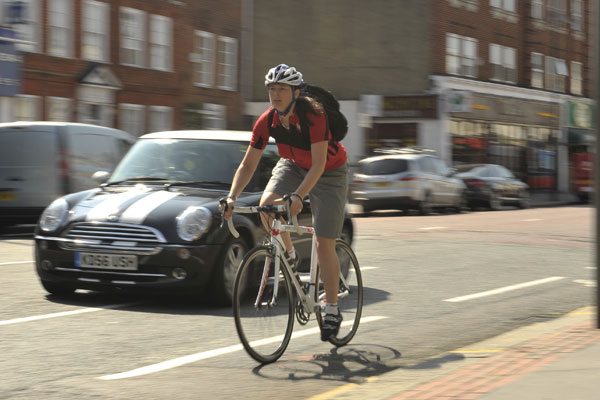Cyclists exposed to five times less air pollution than those in cars, experiment suggests
Study by Healthy Air Campaign, Kings College London and Camden Council measured air pollution for a variety of modes of transport

The latest race content, interviews, features, reviews and expert buying guides, direct to your inbox!
You are now subscribed
Your newsletter sign-up was successful
Those who travel by car can experience five times higher pollution levels than those who cycle, and three and a half times more than those walking, according to an experiment by academics and campaigners.
>>> Benefits of cycling: reasons to get on your bike
In a video, shown on the Guardian website, by the Healthy Air Campaign, Kings College London, and Camden Council, air pollution detectors were fitted to one person driving a car, one on a bus, one on foot and one on a bike on a busy route across central London. One person also cycled and another walked on a quieter parallel route away from busy roads.
Air pollution is a big killer, causing 29,000 premature deaths each year in the UK and 4,300 in London. Road traffic, particularly diesel engines, is a major contributor to this.
Dr Ben Barratt, lecturer in air quality science at Kings College London, said: "By walking and cycling you'll not only create less air pollution yourself but you can reduce your exposure to air pollution. You can take a step further by taking quieter routes away from this traffic."
"But avoiding air pollution is not a sustainable option. This is a very important point. We need to take more action by government to reduce the amount of air pollution in cities."
The study, which measured cumulative levels of black carbon (soot), was carried out to highlight the risks and what people can do to minimise their own exposure to traffic fumes. Unsurprisingly those on quieter routes were exposed to lower levels of pollution than those on the busy routes.
The latest race content, interviews, features, reviews and expert buying guides, direct to your inbox!
Gavin Thomson, of the Healthy Air Campaign, said: "I would ask people to plan their routes and try and stay off main roads, take quieter routes instead, or walk through the park, whether that is on their way to work or wherever they need to go. Also try and find the air pollution levels where they are spending most of their time."
The reason those travelling in cars experience much greater fumes is the exhaust from other vehicles enters from in front and behind and, once there, doesn't disperse.
In the experiment the cyclist's journey was not only quickest, they were exposed to much lower pollution levels than all other journeys, as fumes were able to disperse as they rode along. The pedestrian's levels were higher as their journey took longer.
The driver was also exposed to two and a half times higher pollution levels than those on a bus, which had the second highest exposure, proving that being inside a vehicle does not protect passengers from traffic fumes.
This the study was only a small sample experiment, and isn't the first of its kind, similar journeys have been filmed in the Netherlands, for example, it does highlight for people in the UK - and for London, among Europe's worst polluted cities - the levels of exposure and how to minimise risk.